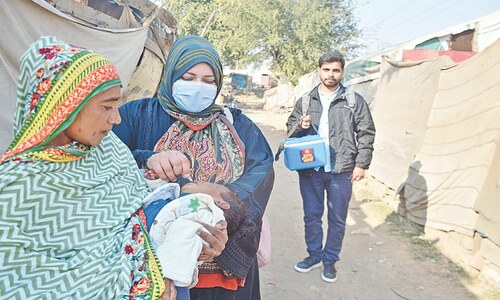LAHORE, April 6: The wheat output in Punjab will be 1.5 million tons less than the target of 18 million tons, and there are worries here that the national yield will also fall to 21.6 million tons, much below the targeted 24 million tons.
Farmers, however, term even the revised figures ‘overly optimistic’ and apprehend another shortfall of 1.6 million tons. They think that the country would not be able to produce more than 20 million tons – around 3 million tons below the national requirement.
According to the final forecast of the Crop Reporting Wing of the Punjab Agriculture Department, the province’s production would be around 16.5 million tons.
Provincial Agriculture Secretary Fayyaz Bashir attributed the shortfall to several factors, like reduction in cultivation area because of delayed sugarcane harvesting, shortage of water and decline in the use of DAP fertiliser because of its rising price.
“To begin with, the area under cultivation dropped by two to three per cent because of the delay in cane harvesting and then water shortage hit the crop.”
He said that rains were less than what water managers had hoped for and DAP prices went through the roof, wiping out more than two million tons of the crop.
Farmers, however, refuse to accept what they call a simplistic explanation. They said it was an extension of a series of wrong decisions.
Bilal Israel, a grower from Sadiqabad, said the government did not announce its procurement price in September, reducing the commercial viability of the crop for farmers. He said that the crop was sown on 20 million acres instead of 20.12 million acres. It was more because of the government’s failure to announce a new procurement price than the delay in cane crop harvesting which made farmers miss the target, he said.
The DAP price, which was Rs900 a bag last year, soared to Rs1,400 at the start of the sowing season and then to Rs2,900 a bag. Farmers were discouraged by the hike in price of the important fertiliser and by the abnormal delay in announcement of the procurement price, he said.
Rana Majid Zafar from Faisalabad says that mismanagement factor caused shortage of irrigation water.
According to Mr Zafar, the shortage was 30 per cent, and not the officially announced 22 per cent. Terming the official water shortage figure incorrect, he said rural areas were hit by power outages of about 10 hours a day, making it impossible for farmers to get sub-soil water.
Ibrahim Mughal of the AgriForum Pakistan said the certified seed stock fell after the wheat price soared last year. He said that farmers sold even the portion of grain they usually kept for sowing and to make matters worse, the stock of the Punjab Seed Corporation proved to be inadequate. “Now the new government needs to help farmers by increasing procurement targets.”
He said that the Punjab Food Department should purchase at least four million tons and Sindh and Passco should buy two million tons each. “Government agencies must not procure less than eight million tons to make up for previous policy mistakes,” he said. “This is the only way to ensure food security, otherwise Pakistan may end up importing more than two million tons of wheat next year,” he said.













































Dear visitor, the comments section is undergoing an overhaul and will return soon.